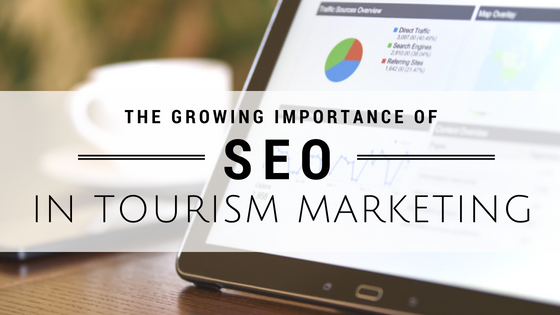The Growing Importance of SEO In Tourism Marketing
SEO is a term we hear often in our marketing and PR circles, but what does it really mean for tourism marketing? What strategies should tourism businesses and destination marketing organizations be focusing on to achieve SEO success? Before I answer these questions, let’s first define SEO. I like the definition provided by MOZ:
Search engine optimization (SEO) is the practice of increasing the quantity and quality of traffic to your website through organic search engine results.
This definition captures the goals (increasing quantity and quality of traffic) and the outcome (organic search engine results) of SEO. I will use the SEO strategy that Break the Ice Media has been deploying since 2017 as a case study to illustrate the key points.
The importance of SEO
Too often, marketers focus on the wrong performance indicators to determine success. Website traffic is a good key performance indicator (KPI) of your online strategy only if it is quality traffic. Meaning the people visiting your website are the best potential customers for your business.
In 2017, when Break the Ice Media put an SEO strategy in place for our agency website, we had acceptable levels of traffic to our website for our size company. However, many of the visitors who found us had searched terms like “break the ice” and “breaking the ice.” These keywords have nothing to do with our core business offering – strategic PR and marketing for travel, tourism and hospitality – or the prospective clients we want to find us. Even though we were happy with the quantity of traffic, we needed a better quality of traffic on our website.
A good SEO strategy allows you to come up in search results for relevant keywords. These target keywords match your organization’s offerings and attract your target audience. Focusing your SEO strategy on quality and quantity will help reduce dependence on online advertising merely to be found. Advertising efforts can then focus on the specific actions you want people to take on your website. SEO should be an integral part of your communications strategy alongside PR, marketing and advertising.
Our SEO results
At Break the Ice Media, we have a integrated communications strategy that includes:
- This blog,
- Our weekly podcast – Destination on the Left,
- Social media channels – Twitter, Facebook and LinkedIn,
- A weekly newsletter,
- Paid Facebook ads,
- SEO
Since implementing SEO into our communications strategy, we have seen our website traffic increase, it doubled in the first year and has been on an upward trajectory since. Our pages viewed per session and time on site increased. All very positive indicators for us. But that is not enough to tell if we are truly successful. There are other metrics that we are watching to measure success. Those additional KPIs measure the success of our individual pieces of content by tracking how much traffic each one gets, how many keywords each one ranks for and how many social shares we get for each piece of content. Here is an example of how an individual content piece is performing:
Our blog post “Travel and Tourism Terms, Acronyms & Abbreviations” – is the 2nd most visited page on our website in the last 12 months and is responsible for over 37,000 sessions since it was first written. Which isn’t surprising, given that it’s been a top-visited page from the beginning.
Why you need a strategy for SEO in tourism marketing
80% U.S. travelers use a desktop or laptop when booking, and those same 80% prefer to do all their research online. 48% of US travelers exclusively use their smartphones to plan and research travel. Google has defined four “micro-moments” as key opportunities for your travel business to be discovered in search results that align with the travel customer journey.
- Dreaming: I want to get away moments
- Planning: Time to make a plan moments
- Booking: Let’s book it moments
- Experiencing: Can’t wait to explore moments
Find more on Google’s support of travel destinations in this workshop presentation from Destinations International 2017 and in my blog post “4 Ways to be part of the Google DMO Partnership Program.”
6 ways to help your website become SEO friendly
1. Optimize your website technology.
This includes getting rid of broken links, making sure tags and page names are accurate, checking on backlinks, verifying listings online and maintaining a regular audit to fix tech issues.
2. Develop a mobile-first approach.
This practice is now “table stakes.” Consumers expect to be able to find your website and interact with it on any device. Being mobile-first goes beyond designing a responsive website. Think like a consumer who is consuming your content on a small screen. Make it easy to read and interact with your content and you’ll gain better engagement and attract more quality visitors to your website.
3. Develop a keyword strategy based on business targets.
This is so important. You must start with a clear understanding of your business goals, your target audience and expected outcomes. Then you can develop a keyword strategy to rank on Google for category searches that are most relevant to your business.
4. Develop a robust content strategy to support the keyword strategy.
A website cannot be static if you want to be found on Google. Your content strategy should include pieces that align with your keywords and help build your authority as the “go to” resource for information.
5. A good SEO strategy is an ongoing exercise.
It needs to be paid its due importance. You need to continuously monitor your KPIs and adjust to maintain and build your SEO ranking.
6. It is a good idea to engage with an SEO consultant.
They keep track of trends and can identify issues. Like so many things in business, you cannot do everything in-house. Engaging with an SEO consultant will help you experience success and get there sooner.
Author
Related Posts
Maximizing and Proving Trade Show ROI
Trade shows are a significant investment. Between booth space, travel, staffing and time away from the office, the costs add up quickly. Most tradeshow websites justify that…
Themes from ABA 2026 Part 2: Embracing the Experience
In Part 1 of this series, we explored how collaboration has become essential to the future of group travel. Another change that is quickly becoming…


